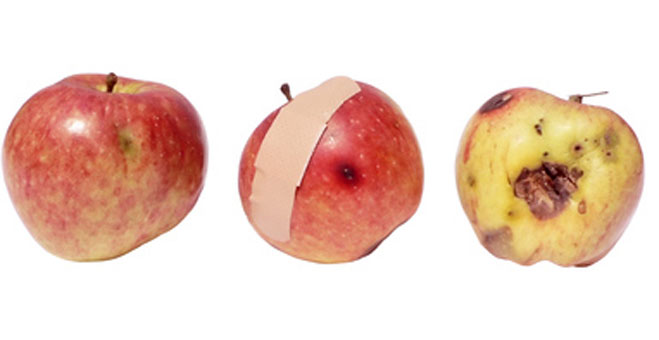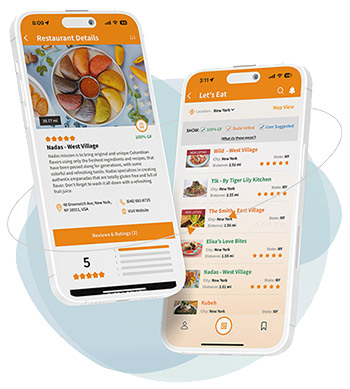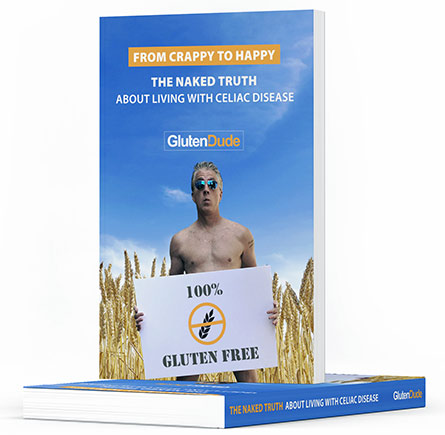Celiac Disease: The Good
- It CAN lead to a healthier lifestyle (assumimg you don’t substitute your normal foods with processed gluten-free crap.)
- It is very good for your discipline. When you are FORCED to give up something, it’s amazing how doable it becomes. And then you realize, “Well damn…if I can give up all of these foods I used to love, I can give up other unhealthy things too.” It’s pretty empowering.
- It’s treatable without expensive medication or painful procedures (unless of course you consider eating Glutino bagels painful).
- Hmmm…I’m sure there’s more good things about celiac….thinking…thinking…ok maybe not.
Celiac Disease: The Bad
- Going out to eat can be a pain in the a*s.
- Your food bill can skyrocket, even if you are not buying gluten-free replacement items. Thanks to our wonderful food industry, eating healthier is just more expensive. And you wonder why we have an obesity problem. Sorry…stepping off my soapbox now.
- Because of the gluten-free craze, getting taken seriously can become a bit of a challenge. I’ve touched on this subject enough recently so there is no need to rehash. But you can read my thoughts about it here, here, here and here.
- Spontaneity goes out the window. There is no more winging it when it comes to eating. This is especially true when you are on the road.
- It can be tough to diagnose (though that may be due more to doctor’s laziness than the disease itself.)
Celiac Disease: The Ugly
- It can be an ungodly frustrating disease. Even gluten-free, a laundry list of symptoms can come out of nowhere.
- People with celiac disease have an increased mortality rate compared to the general population.
- It is a life-long disease. Once you are diagnosed, there is no going back to a “normal” lifestyle.
- Celiac sux…plain and simple.
Have something to add to the list? Let’s hear it.






Another good for you: I’ve been told, although I haven’t gone this route myself, that in Canada there are tax credits available for those who are diagnosed and present a doctor’s certificate. Finding out more about this is on my to do list.
Yes…other countries make it much more simpler than the U.S.. We need to jump thru hoops to get a tax break…not worth the effort.
The hoop jumping occurs in Canada, too. At the Gluten Free Expo, many were commenting that it was not worth it. We have to calculate, for example, how many loaves of bread we bought last year and multiply that number by the difference between the price of a gluten-free loaf of bread and a regular loaf of bread. And then apparently the deduction is only based on a percentage of your income or something like that (scrambling to find the answer). I’ll be trying it this year, so we will see!
The medical expenses (gluten-free incremental amounts) must exceed 3% of net income or $2109, whichever is less. Example: If net income is $30,000, and your medical expenses are $1500, you get $120.
Thanks Sassy. Not poo-pooing it, but IMHO, not worth the effort.
That’s about what it is in the US as well. Keep the receipts of the GF food purchases, document what ‘regular’ food costs, you can deduct the difference and only a portion for each person in the house that is GF (if you cook GF for everyone, but only two people are celiac, then you can only deduct for two people). and then you can only deduct medical on your US federal income tax if it exceeds a certain amount of your gross adjusted income.
The difference between the cost of gluten free food and conventional food can be submitted as a claim against a Flexible Spending Account (FSA) or a Heath Reimbursement Arrangement (HRA).
You have to submit the receipt for the actual food purchase, and do some research and find the comparable cost: i.e. a bag of regular pretzels (maybe $2.99) to a same-size bag of Glutino pretzels ($5.99) and submit the $3 difference. I use an excel spreadsheet to show both prices, and quickly total the differences for my claims. There is no ‘percentage of income’ floor to the costs you can submit this way, only a limit on how much you can put into an account, assuming your employer has one. I know that last year alone, while it was time consuming, I claimed over $1000. You must have a doctors note stating you must eat gluten free in order for any of this to be possible as well. If you fund the account with pre-tax dollars, you are essentially saving the taxes on this difference in costs (your claims) and in some cases employers fund HRAs so then you are getting the tax benefit AND having part of the actual costs reimbursed.
More can be found at http://www.ehow.com/how_2089426_get-tax-deductions-food.html
Sorry if I got to ‘accountant’ like…I spend a lot of time administering health benefits in my ‘day’ job 🙂
How about the Good of no longer suffering whatever symptoms you suffered pre-diagnosis? Agree about losing spontaneity, that really sucks, and the best thing I think is that OK, it is a lifelong condition but it is something to treat by *not* doing something (ie. eating gluten) rather than having to do anything like take medications, operations, as long as I don’t eat gluten…I am totally well. 🙂
Good points. Though feeling “totally well” seems to escape a lot of celiacs, even if off gluten.
A good… meeting awesome new people in the gluten free community!
Absolutely Janelle!!
One of the ugly is me when I have to go all militant in my kitchen….I am the only gluten free eater in my house…thus the fear of CC lurks around every corner, on every counter and in every crevice!! I have never in my life said don’t touch anything until you wash your hands as much as I have since celiac came into my life! And totally well?? That is a fantasy land for me that is far far away!
My kids love bagels, donuts, etc. So gluten crumbs are a way of life in our kitchen. It can indeed by ugly.
Ya so am I in my hole entire family
the ugly: no matter how careful you are, you will end up getting glutened in some way.
Seems to be the way, doesn’t it? Sigh…
The Good – You get to try and hopefully like new foods you didn’t eat before diagnoses .
The Bad or the The Ugly ( Depending on how much you look at it ) – The fad and celebs on fake gluten free diets picking and choosing when the eat gluten , not only do they boast about how they eat gluten but the idea it gives to the public . If ever I tell people about CD and the GF diet they act like it’s nothing and never interferes with life …
If only the people who went GF for the hell of it got the additional health problems and vitamin / mineral deficiencies we got , Shame 🙁
Preaching to the choir. Hopefully, our message will resonate eventually.
I have a gluten sensitivity not celiac (going for a definite diagnosis in May) so my take is based on that. However, I have suffered from allergies and digestive problems since I was at least 6. Now that I am finally on a very strict diet (no gluten, no dairy, no eggs and a few other odd things here and there). I am finally feeling great. Given how many people suffer from digestive and allergy problems out there, I feel that having to be GF has improved my health WAY above that of the average person out there (plus I rarely get sick). I have also lost weight without even wanting to. To me the plus side is so much more than the minus one that I would still eat this way even if did not have to. After all, how many people do a paleo diet (no grains, no dairy) simply for health reasons?
We are indeed what we eat Jeanine and I wish people took their diet more seriously. We’d be a much healthier society.
I’m not official Celiac dx’d. My GI refused to test me (ah, the medical world) but asked three years later for me to let them test me. I asked if they were going to pay for me to be off work for a month, while the gluten got out of my system. They seemed shocked by my response.
I’m not celiac dx’d but I consider myself to be celiac based on what happens when I eat gluten. I also have another auto-immune disorder (so my chances of having a separate one were increased already) AND I have at least two family members dx’d as celiac (a sibling and an aunt)
Negatives: Having to tell family members you can’t eat their food they cooked ‘especially’ for you with no wheat–just ‘white’ bread.
Positives;
No more unintended snacking when out and about (Oh, let’s run to __ and have ___).
Remembering not to eat gluten based upon the “Is it worth the pain” scale–positive b/c you’re more aware of your body.
Experimenting with grains you’ve briefly heard of but never paid any attention to and then realizing you’re better off just eating meat, fruits and veggies (oh, and cheese!). So much easier and no reading labels on that stuff.
I like your last point a lot. Less ingredients, the better. And totally cool on your part asking your doc to cover your expenses if you have to go back on gluten. Man…am I soured on the medical community.
The ugliest for me is that even while strictly sticking to my diets (Acid Reflux & low fat, high fiber in addition to Celiac) I still do not feel totally well. The good is I feel better most of the time.
Rick…you just summed up in two sentences what a majority of celiacs feel; better, but not great.
I have been diagnosed ten years ago after suffer all my life and I agreed it gets much better but still you struggle, it”s not easy…..
Ugly:
– not all countries have tax credit on glutenfree (gf) food and (even uglier!) gf food can be there more expensive (and incomes lower) than in countries with tax credit (e.g. Slovenia – this little chicken in the north-west of Balkan Peninsula in Europe).
– you can get a very ugly experiences while ordering a cup of coffee
– your girlfriend can leave you because of diet and urges you to eat wheat based bread
– gf food can be very expensive, despite its quality is poor (e.g. pasta from Schär)
– you have to go through gastroscopy – it is so hurtful and bad! I hate invasive endoscopy altogether!
I have an entire two extra things for “The Good” list bundled into a 5 Best Things about being Coeliac list
http://foreverfreefrom.com/5-best-things-coeliac/
Oh, here is one more for “The Ugly” too, the different spelling of coeliac (UK) and celiac (US and I think rest of english speaking world). I am British and I much prefer the spelling without a silent ‘o’, but hey, I’d prefer not to be coeliac or celiac and not worry about the spelling at all! 😛